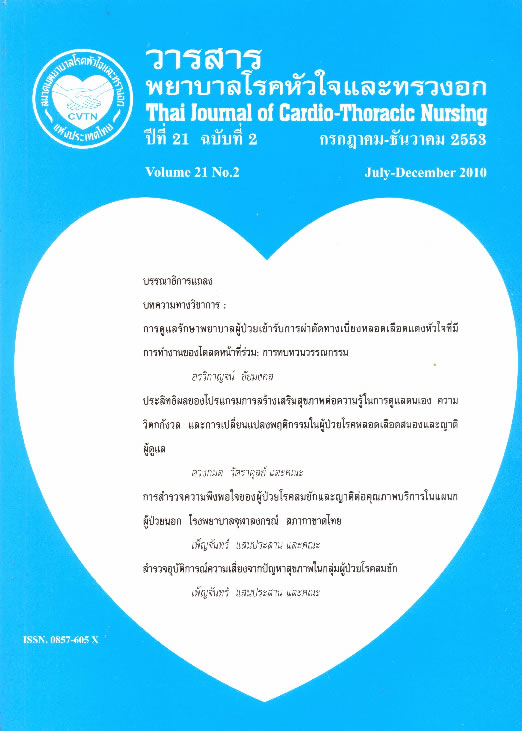ประสิทธิผลของโปรแกรมการสร้างเสริมสุขภาพต่อความรู้ในการดูแลตนเอง ความวิตกกังวล และการเปลี่ยนแปลงพฤติกรรมในผู้ป่วยโรคหลอดเลือดสมองและญาติผู้ดูแล
คำสำคัญ:
Health promotion, Self care knowledge, Anxiety, Stroke patients, Caregivers, การสร้างเสริมสุขภาพ, ความรู้ในการดูแลตนเอง, ความวิตกกังวล, ผู้ป่วยโรคหลอดเลือดสมองญาติผู้ดูแลบทคัดย่อ
บทคัดย่อ
การวิจัยกึ่งทดลองแบบ one group pretest - posttest design ครั้งนี้มีวัตถุประสงค์เพื่อทดสอบ ประสิทธิผลของโปรแกรมการสร้างเสริมสุขภาพต่อความรู้ในการดูแลตนเอง ความวิตกกังวล และการ เปลี่ยนแปลงพฤติกรรมในการสร้างเสริมสุขภาพในผู้ป่วยหลอดเลือดสมองและญาติ คัดเลือกกลุ่มตัวอย่าง แบบเจาะจง ได้แก่ ผู้ป่วยหลอดเลือดสมอง 27 ราย และญาติ 35 ราย ที่มาใช้บริการที่แผนกผู้ป่วยนอก โรงพยาบาลจุฬาลงกรณ์ เข้าร่วมโปรแกรม “แข็งแรงด้วยตัวเรา” ประกอบด้วยการอบรมเชิงปฎิบัติการฝึกทักษะการออกกำลังกาย การดูแลตนเอง แลกเปลี่ยนประสบการณ์ในการดูแลตนเอง และมอบวีดีทัศน์ การออกกำลังกาย และคู่มือการดูแลตนเองให้แก่กลุ่มตัวอย่างไปฝึกทักษะที่บ้าน เก็บข้อมูลโดยใช้แบบทดสอบความรูในการดูแลตนเอง ความวิตกกังวลก่อนและหลังเข้าร่วมโปรแกรม และให้กลุ่มตัวอย่างประเมิน ความพึงพอใจในการเข้าร่วมโปรแกรม และประเมินการเปลี่ยนแปลงพฤติกรรมโดยใช้แบบสอบถามการ เปลี่ยนแปลงพฤติกรรม และส่งกลับมาภายหลัง 1 เดือนทางไปรษณีย์
ผลการวิจัยพบว่ากลุ่มตัวอย่างมีคะแนนเฉลี่ยความรู้ในการออกกำลังกายและการดูแลตนเองเพิ่มขึ้น และมีคะแนนเฉลี่ยความวิตกกังวลลดลงอย่างมีนัยสำคัญทางสถิติ (p < 0.01) และประเมินความพึงพอใจ ในการเข้าร่วมโปรแกรมในระดับมากที่สุด (mean = 4.74) เมื่อติดตามในระยะ 1 เดือน พบว่ากลุ่มตัวอย่าง ส่งแบบประเมินกลับมาร้อยละ 37.04 ส่วนใหญ่ร้อยละ 60 มีการเปลี่ยนแปลงพฤติกรรมโดยการออกกำลังกาย และดูแลตนเองอยู่แล้วอย่างต่อเนื่องเป็นเวลามานานมากกว่า 6 เดือน กลุ่มตัวอย่างนำวิดีทัศน์ไปใช้อย่างต่อเนื่อง นำไปเผยแพร่ให้กับเพื่อนและญาติ
ผลการวิจัยเสนอแนะให้มีการจัดบริการสุขภาพในแผนกผู้ป่วยนอกเพื่อส่งเสริมการดูแลตนเองในผู้ป่วยโรคหลอดเลือดสมองและญาติ พยาบาลควรติดตามและสนับสนุนให้ผู้ป่วยมีพฤติกรรมการดูแลตนเอง อย่างต่อเนื่อง เพื่อลดความวิตกกังวล ป้องกันภาวะแทรกซ้อน และมคุณภาพชีวิตที่ดี
คำสำคัญ : การสร้างเสริมสุขภาพ, ความรูในการดูแลตนเอง, ความวิตกกังวล, ผู้ป่วยโรคหลอดเลือดสมอง, ญาติผู้ดูแล
Abstract
The purpose of this quasi-experiment study, one group pretest-posttest design, was to examine effects of health promotion program on self care knowledge, anxiety and behavioral change in stroke patients and caregivers. Purposive sampling of 27 stroke patients and 35 caregivers at Out Patient Department of King Chulalongkorn Hospital was conducted. Health promotion program "Healthy by yourself" consisted of group workshop of exercise training, providing information of self care in stroke patients, group sharing of self-care experiences. After workshop, participants received exercise VCD and hand book of self-care to use as guideline at home. Self care knowledge and anxiety scores were evaluated before and after the intervention. Satisfaction of program was evaluated after the intervention. In addition, stage of behavioral change questionnaire was evaluated and sent back by them via post mail one month after the intervention.
The results of the study revealed that the samples had improvement on self care knowledge and had decrease anxiety score significantly (p < 0.01). They evaluated the satisfaction of program as excellent (mean = 4.74). In addition, 37.04% of samples returned the stage of behavioral change questionnaire by mail. About 60% of them reported that they were successful in achieving a proposed behavioral change by ongoing doing exercise and self-care along 6 months. They could exercise continuously using exercise VCD and distributed them to their friends and relatives.
Recommendation: This program should be applied to promote self care for stroke patients and caregivers at out patients department. Nurses should monitor and promote patients to have self care behavior to reduce anxiety, prevent complication and improve their quality of life.
Keywords : Health promotion, Self care knowledge, Anxiety, Stroke patients, Caregivers
ดาวน์โหลด
รูปแบบการอ้างอิง
ฉบับ
ประเภทบทความ
สัญญาอนุญาต
บทความนี้ยังไม่เคยตีพิมพ์หรืออยู่ในระหว่างส่งไปตีพิมพ์ในวารสารอื่น ๆ มาก่อน และกองบรรณาธิการขอสงวนสิทธิ์ในการตรวจทาน และแก้ไขต้นฉบับตามเกณฑ์ของวารสาร ในกรณีที่เรื่องของท่านได้ได้รับการตีพิมพ์ในวารสารฉบับนี้ถือว่าเป็น ลิขสิทธิ์ของวารสารพยาบาลโรคหัวใจและทรวงอก






